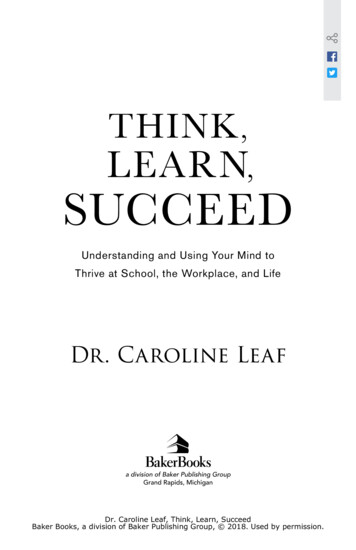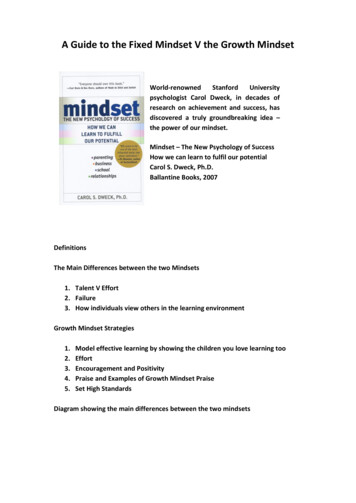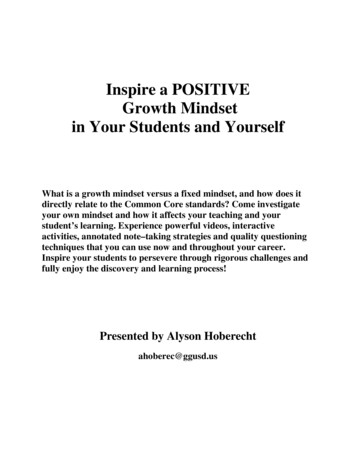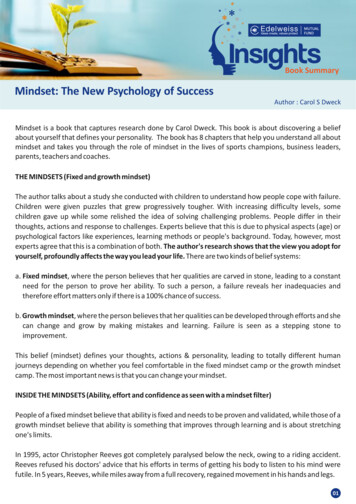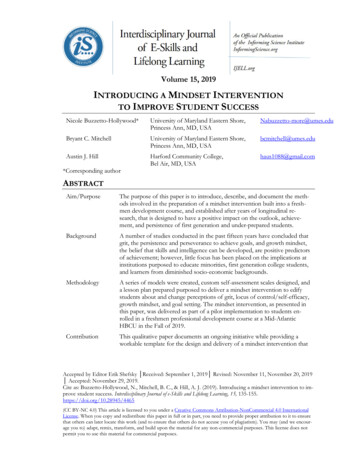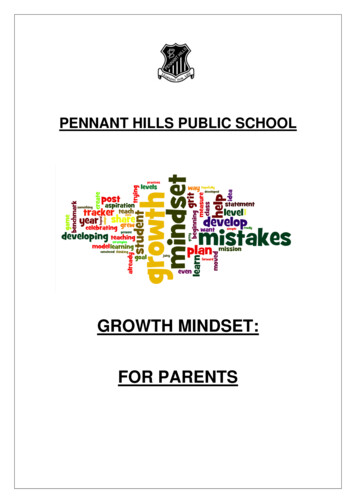
Transcription
PENNANT HILLS PUBLIC SCHOOLGROWTH MINDSET:FOR PARENTS
INTRODUCTIONMindset is a simple idea discovered by world-renowned Stanford Universitypsychologist Carol Dweck in decades of research on achievement and success. DrDweck realised that there are two mindsets: a fixed mindset and a growth mindset. Aperson’s mindset can profoundly influence behaviour.People with a fixed mindset believe that their innate abilities and intelligence are fixedtraits. You can either do maths or you can’t. You can either make friends or you can’t.They also believe that talent alone creates success- without effort. With a fixedmindset, there is a reluctance to take on new challenges.People with a growth mindset believe that they can learn, change and developneeded skills through dedication and hard work. They are better equipped to handlesetbacks and know that hard work and effort helps them accomplish and learn. Thisview creates a love of learning and a resilience that is essential for greataccomplishment. Virtually all people who achieved top performance had thesequalities.The University of Pittsburgh Office of Child Development conducted a research studywhich examines the effect of a growth mindset in early childhood and showed thatprocess-focused feedback is a more constructive approach than simply praising achild for an accomplishment. Engaging a child in the process can reinforce the valueof effort and persistence and help a child understand that mistakes are part of learning.As adults, every word and action sends a message. It tells children how to think aboutthemselves. It can be a fixed mindset message .or a growth mindset message. Themost important thing you can do to help your child develop a growth mindset is topraise them for process and effort, rather than talent. Messages such as “I like the wayyou went about solving that problem”, “Great job to keep trying and find a differentstrategy that does work” or “I’m so happy that you learned something from the mistakeyou made” teach children that effort and process are important in reaching our fullpotential and that they need to be working purposefully in order to grow. By teachingour children that they can try new things, learn new things, and that their brains arewired to change and grow, we arm them with the tools for life-long learning.
READINGS
GROWTH MINDSET: AN INTRODUCTIONThe beginning of each new school year is always full of hope and promise and yourchildren adjust to their new classrooms and teachers. As parents, you would have allkinds of hopes and dreams for your children- and yourselves. You’d like your children tolearn and enjoy learning, be happy and to have friends, to develop self-reliance andconfidence. You’d like for yourselves to become more calm and patient, to developsystems that make your household more efficient and less stressful, and to experiencemore loving and caring family connections.Sounds like a lot of goals and a tall order! But there is a very simple principle which caninform the way you look at these goals and put you in the correct mindset for working onthem with yourselves and your children. Mindset is a simple idea discovered by worldrenowned Stanford University psychologist Carol Dweck in decades of research onachievement and success. Dr Dweck realised that there are two mindsets: a fixed mindsetand a growth mindset. A person’s mindset can profoundly influence behaviour.People with a fixed mindset believe that their innate abilities and intelligence are fixedtraits. You can either do maths or you can’t. You can either make friends or you can’t.They also believe that talent alone creates success- without effort. With a fixed mindset,there is a reluctance to take on new challenges.People with a growth mindset believe that they can learn, change and develop neededskills through dedication and hard work. They are better equipped to handle setbacks andknow that hard work and effort helps them accomplish and learn. This view creates a loveof learning and a resilience that is essential for great accomplishment. Virtually all peoplewho achieved top performance had these qualities.A fixed mindset stops you in your tracks and limits your achievement. A growth mindsetopens up possibilities and always offers you opportunities to grow and learn.
FIXED vs GROWTH: THE TWO BASIC MINDSETS THAT SHAPE OUR LIVESWhen students and educators have a growth mindset, they understand thatintelligence can be developed. Students focus on improvement instead of worryingabout how smart they are. They work hard to learn more and grow in their learning.The following is an extract from an article in Brain Pickings, ‘Fixed vs Growth: The TwoBasic Mindsets that Shape Our Lives’:In one study, Dr Dweck offered four-year-olds a choice: They could either redoan easy jigsaw puzzle, or try a harder one. Even these young children conformed tothe characteristics of one of the two mindsets — those with “fixed” mentality stayed onthe safe side, choosing the easier puzzles that would affirm their existing ability,articulating to the researchers their belief that smart kids don’t make mistakes; thosewith the “growth” mindset thought it an odd choice to begin with, perplexed why anyonewould want to do the same puzzle over and over if they aren’t learning anything new.In other words, the fixed-mindset kids wanted to make sure they succeeded in order toseem smart, whereas the growth-mindset ones wanted to stretch themselves, for theirdefinition of success was about becoming smarter.Dweck quotes one seventh-grade girl, who captured the difference beautifully:I think intelligence is something you have to work for it isn’t just given toyou. Most kids, if they’re not sure of an answer, will not raise their hand toanswer the question. But what I usually do is raise my hand, because if I’mwrong, then my mistake will be corrected. Or I will raise my hand and say, ‘Howwould this be solved?’ or ‘I don’t get this. Can you help me?’ Just by doing thatI’m increasing my intelligence.Things got even more interesting when Dweck brought people into Columbia’s brainwave lab to study how their brains behaved as they answered difficult questions andreceived feedback. What she found was that those with a fixed mindset were onlyinterested in hearing feedback that reflected directly on their present ability, but tunedout information that could help them learn and improve. They even showed no interestin hearing the right answer when they had gotten a question wrong, because they hadalready filed it away in the failure category. Those with a growth mindset, on the otherhand, were keenly attentive to information that could help them expand their existingknowledge and skill, regardless of whether they’d gotten the question right or wrong —in other words, their priority was learning, not the binary trap of success and failure.These findings are especially important in education and how we, as a culture, assessintelligence. In another study of hundreds of students, mostly adolescents, Dweck andher colleagues gave each ten fairly challenging problems from a nonverbal IQ test,then praised the student for his or her performance — most had done pretty well. Butthey offered two types of praise: Some students were told “Wow, you got [X many]right. That’s a really good score. You must be smart at this,” while others, “Wow, yougot [X many] right. That’s a really good score. You must have worked really hard.” Inother words, some were praised for ability and others for effort. The findings, at thispoint, are unsurprising yet jarring:The ability praise pushed students right into the fixed mindset, and they showedall the signs of it, too: When we gave them a choice, they rejected a challengingnew task that they could learn from. They didn’t want to do anything that couldexpose their flaws and call into question their talent.In contrast, when students were praised for effort, 90 percent of them wantedthe challenging new task that they could learn from.
The most interesting part, however, is what happened next: When Dweck and hercolleagues gave the students a subsequent set of harder problems, on which thestudents didn’t do so well. Suddenly, the ability-praised kids thought they weren’t sosmart or gifted after all. Dweck puts it poignantly:If success had meant they were intelligent, then less-than-success meant theywere deficient.But for the effort-praised kids, the difficulty was simply an indication that they had toput in more effort, not a sign of failure or a reflection of their poor intellect. Perhapsmost importantly, the two mindsets also impacted the kids’ level of enjoyment —everyone enjoyed the first round of easier questions, which most kids got right, but assoon as the questions got more challenging, the ability-praised kids no longer had anyfun, while the effort-praised ones not only still enjoyed the problems but even said thatthe more challenging, the more fun. The latter also had significant improvements intheir performance as the problems got harder, while the former kept getting worse andworse, as if discouraged by their own success-or-failure mindset.It gets better — or worse, depending on how we look at it: The most unsettling findingcame after the IQ questions were completed, when the researchers asked the kids towrite private letters to their peers relaying the experience, including a space forreporting their scores on the problems. To Dweck’s devastation, the most toxicbyproduct of the fixed mindset turned out to be dishonesty: Forty percent of the abilitypraised kids lied about their scores, inflating them to look more successful. Shelaments:In the fixed mindset, imperfections are shameful — especially if you’re talented— so they lied them away. What’s so alarming is that we took ordinary childrenand made them into liars, simply by telling them they were smart.This illustrates the key difference between the two mindsets — for those with a growthone, “personal success is when you work your hardest to become your best,” whereasfor those with a fixed one, “success is about establishing their superiority, pure andsimple. Being that somebody who is worthier than the nobodies.” For the latter,setbacks are a sentence and a label. For the former, they’re motivating, informativeinput — a wakeup call.
STUDENT BELIEFS AND SCHOOL EXPERIENCESThis brief article from PERTS is related to how students’ beliefs about intelligenceshape their experiences in school:On Monday morning, Anna wakes up excited for school. In lastweek’s math class, her teacher introduced fractions. All week, Anna worked hardto understand the concepts, but she still hasn’t quite grasped them. It’s the firsttime she’s really struggled with math, but she's excited about the opportunity tostretchherselfandplanstoasktheteacherforhelp.A few blocks away, her friend Michael wakes up dreading school. He is in thesame math class as Anna, and he’s also struggling with math for the first time.Michael worries that his trouble with fractions means that maybe he’s just not a“math person.” He plans to avoid answering questions in class, because hedoesn’twanttheotherkidstothinkhe’sstupid.Why do Anna and Michael react differently to the same experience? Anna isacting with a growth mindset--the belief that intelligence is malleable, whileMichael is acting with a fixed mindset--the belief that intelligence is a fixed trait.Why Do Mindsets Matter?Students’ beliefs about intelligence can have a powerful influence on how theyexperience school. For students who have a growth mindset, school is anexciting place. It provides them with an opportunity to learn, which is exciting ifyou believe intelligence can be developed. Learning is how you develop yourintelligence. These students also welcome the challenges that they face inschool. Challenges signal something that they don’t already know, so they areparticularly useful opportunities to grow their intelligence.However, for students with a fixed mindset, school can be a threatening place.In a fixed mindset, school is all about judgment and performance. It is a placewhere students go to be told whether or not they are smart--what they are goodat and what they are bad at. They conclude that they are not smart at somethingif they have to put in effort or ifschoolwork is challenging.When students with a growth mindset face a challenge, they thrive because theywork through that challenge with a purpose--the excitement of learningsomething new and developing their intelligence. When students with a fixedmindset face a challenge, they falter because they believe that they havediscovered something they are not good at.
GROWTH MINDSET AND THE BRAINAn important aspect in developing a growth mindset is understanding how the brainfunctions. Current research shows that the brain is much more malleable thanpreviously thought. It was once believed that the brain did not grow new cells, and thatthere were severe limitations on the malleability, or neuroplasticity, of the brain afterearly childhood. In the past few decades, research has shown that learning causessubstantial changes in the brains of human beings throughout life.Thinking occurs in the brain through the chemical communication of nerve cellsconnected in a complex network. With learning, the cells of the brain develop newconnections between them, and existing connections become stronger. Studies inneurophysiology, neuroanatomy and brain imaging have shown that when peoplepractice and learn new skills, the areas of the brain responsible for those skills actuallybecome larger and denser with neural tissue, and that new areas of the brain becomeactive when performing related tasks. Furthermore, it has been found that the braincontinues to grow new nerve cells, or neurons, daily, and that this process speeds upwhen a lot of active learning is occurring.Thus, the brain has the capacity to develop throughout life. However, this developmentdepends on the stimulation of challenge and learning. This fact makes it all the morecritical that students be motivated to apply effort, take an active role in learning andembrace challenges of learning.
TIPS FOR PARENTS
TIPS FOR PARENTS Explain to your child how the brain can grow stronger and that intelligence canimprove throughout your life. Intelligence is not fixed. It’s changeable. This iscalled brain plasticity.What’s more, learning CHANGES our brains. Children need to know this ispossible. Develop a feeling in your child that he/she has the power to do somethingthrough their own efforts. When using their brain in an effective way, childrenfeel more in control of themselves and what they can achieve. Praise yourchild for using different parts of their brain eg “Drawing a picture is a great problem-solving strategy.” “I liked how you explained the problem out loud- it helps to talk aboutthings.” Give feedback on PROCESS only. Praise effort, persistence, strategies,seeking challenges, setting goals, planning, or using creative strategies.Don’t praise personal abilities like being smart, pretty, or artistic.A. Praise the strategy e.g., "You found a really good way to do it."B. Praise with specificity e.g., "You seem to really understand how to add twonumbers."C. Praise effort e.g., "I can tell you've been practising." Reinforce that effort brings about more success- and working hard can behard! Remind your child that when he/she is working hard, they are ‘workingout’ their brain and using it like a muscle to make it grow stronger. Say thingslike: “If it is easy, you aren’t learning anything new.” “When it’s hard work, you’re building your brain and making it stronger.” “Everything is hard before it gets easy.” “Sometimes it takes lots of practice to learn something new.”
Encourage your child to use new strategies and not be discouraged bydifficulties. Reminding your child that a new task can be tough, especiallywhen it is a brand new skill, will help them stay persistent. Knowing that otherpeople struggle, too, helps children overcome their frustration with difficulttasks. Eg “I don’t know anyone who hasn’t struggled with this problem.” “If you could already do this without effort, you wouldn’t be learninganything.” Acknowledge that making mistakes is an important part of learning. Now isthe time to let our children risk and fail. Failure teaches our childrenimportant life lessons. For one, it’s how they learn resiliencyBut we often want to prevent our children from failing, from feeling upset orsad.Don’t. We must let our children fail now so that they can strengthen theirgrowth mindset muscles. If we don’t, they will be adults with no perseverance,with no belief in their abilities to work hard and succeed. “You can use this mistake. Think about why it didn’t work, and learnfrom it.” “Never mind. Try again.” “A mistake-fine. What can you learn?” “Mistakes are wonderful opportunities to learn.” Encourage your child to take a risk. Watch and listen to your child so you cantake cues about what else they are ready to tackle. Vygotsky calls this the“zone of proximal development” – when we gently nudge children to use whatthey know to try something just a bit out of their reach, but yet developmentallyappropriate. By offering small but achievable challenges, confidence andpersistence emerge. Remind them of the power of the word “yet”. When your child says that theycan’t do something, tell them “yes, Jack, you can’t do this YET, but withpractice you will be able to do it.” The power of this word is huge! All of asudden, learning becomes achievable instead of that distant goal that seemsbeyond reach. Make YET a powerful word in your vocabulary.
Encourage and model positive self-talk. Tell your child to use that little voicethey hear in their head to move them towards their goals and achievingsomething positive. The self-talk of a child with growth mindset sounds like“Giving talks is hard. But I’m going to give it a go and do my best.”The self-talk chart below from Fieldcrest Elementary is a good illustration ofthis: Be persistent and growth-orientated yourself. Narrate your thoughts as youtry something new or frustrating (with a G-rating, of course!). Your child mayeven be able to offer some helpful tips. This allows children to see we allhave to work hard to solve problems and we all continue to learn new things. Discourage envy of peers, and talk to your child about what he or she canlearn from others who appear more successful. While skills may come moreeasily to some, most often there’s the (possibly unseen) element of practice,persistence and hard work which leads to success.
Model persistence and share other success stories. Share your stories of‘happy endings’, but be sure to include the setbacks you encounteredalong the way. Share other success stories of people who failed, mademistakes and still persevered. Sport offers a great variety of suchexamples. Let children know when they have demonstrated a growth mindset!REFERENCESWebsitesPERTSBrain PickingsLifehack BlogOxford LearningYour Brain Health
PHPS GROWTH MINDSET UNIVERSALLANGUAGE My brain is fantastic and elastic! Train my brain. The more I use my brain, the stronger it gets. . YET I love challenges! The more effort I put in the better I seem to get. Never give up! FAIL First Attempt In Learning It is OK to make mistakes. Mistakes help me learn.
FOR YOU TOREMEMBER!Don’t praiseachievementPRAISE EFFORTAND STRATEGIESFOR OUTCOMESDo praise Effort Risk-taking Challenge seeking Strategies forlearning Optimism ResilienceDeveloping student mindset atPHPS# You Can Learn Anything
FOR YOURFRIDGEWe know that: Mistakes help uslearn We can train ourbrains We embracechallenge Growth requireseffort We can learn fromthe success of others Learning is hardwork .and we lovehard work at PHPS!# You Can Learn Anything
Mindset is a simple idea discovered by world-renowned Stanford University psychologist Carol Dweck in decades of research on achievement and success. Dr Dweck realised that there are two mindsets: a fixed mindset and a growth mindset. A person’s
